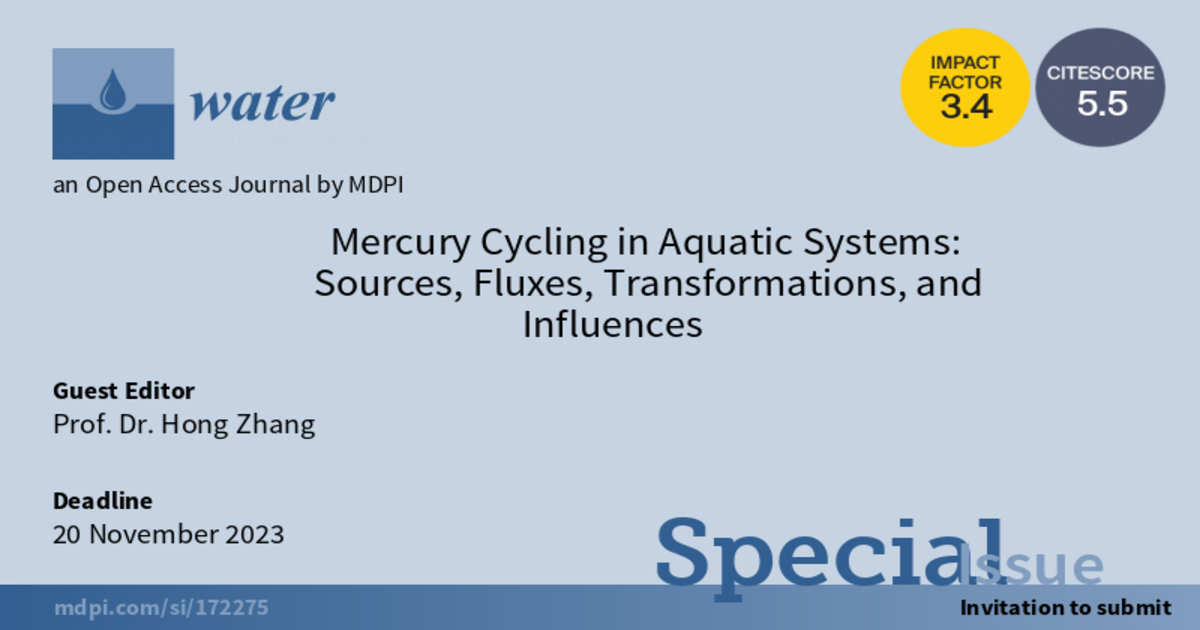Mercury Cycling in Aquatic Systems: Sources, Fluxes, Transformations, and Influences
A special issue of Water (ISSN 2073-4441). This special issue belongs to the section "Water Quality and Contamination".
Deadline for manuscript submissions: closed (20 November 2023) | Viewed by 375

Special Issue Editor
Interests: water chemistry; soil chemistry; environmental photochemistry; environmental chemistry of mercury and chromium; environmental chemodynamics
Special Issues, Collections and Topics in MDPI journals
Special Issue Information
Dear Colleagues,
Mercury (Hg) remains a challenging, persistent, global pollutant. It is of paramount concern, especially in aquatic systems, since it is transformed into neuro-toxins such as methylated Hg, i.e., methyl mercury (CH3Hg(II)+) and dimethyl mercury ((CH3)2Hg(II)), mainly by aquatic microbes, thus entering the aquatic food chain. Hg is constantly engaging in a chemical redox cycling in waters between divalent Hg (Hg(II), the precursor to methylated Hg, and gaseous elemental Hg(Hg(0)). Hg(II) can enter aquatic systems via wet deposition (e.g., rain and snow) or runoff, while dissolved gaseous mercury (Hg(0), called DGM), can emit into the air, joining the global Hg cycle. Aquatic Hg transport and transformation thus profoundly impact regional and global Hg biogeochemical cycling. Hg's challenging and complex nature as a global pollutant has provided an ever-reviving impetus for the continuous advancement of environmental Hg research.
This Special Issue (SI) of Water on mercury intends to provide a platform to collect showcases and snapshots of the latest Hg research focused on aquatic Hg cycling in a broad spectrum embracing various perspectives, including sources, fluxes at water/air, water/soil, or water/sediment interfaces, transformations, biogeochemical cycles, Hg in fishes and aquatic birds, toxicology, risk assessment, influences on aquatic ecology or human society, environmental Hg modeling, Hg remediation, and many other pressing or persistent issues. Moreover, research on Zn and Cd in the triad of Zn-Cd-Hg of the periodic table may also be of particular interest in this SI as the research on Zn and Cd can offer engaging, inspiring insights into the Hg research from a comparative perspective.
Prof. Dr. Hong Zhang
Guest Editor
Manuscript Submission Information
Manuscripts should be submitted online at www.mdpi.com by registering and logging in to this website. Once you are registered, click here to go to the submission form. Manuscripts can be submitted until the deadline. All submissions that pass pre-check are peer-reviewed. Accepted papers will be published continuously in the journal (as soon as accepted) and will be listed together on the special issue website. Research articles, review articles as well as short communications are invited. For planned papers, a title and short abstract (about 100 words) can be sent to the Editorial Office for announcement on this website.
Submitted manuscripts should not have been published previously, nor be under consideration for publication elsewhere (except conference proceedings papers). All manuscripts are thoroughly refereed through a single-blind peer-review process. A guide for authors and other relevant information for submission of manuscripts is available on the Instructions for Authors page. Water is an international peer-reviewed open access semimonthly journal published by MDPI.
Please visit the Instructions for Authors page before submitting a manuscript. The Article Processing Charge (APC) for publication in this open access journal is 2600 CHF (Swiss Francs). Submitted papers should be well formatted and use good English. Authors may use MDPI's English editing service prior to publication or during author revisions.
Keywords
- algae/algal
- anthropogenic pollution
- aquatic ecology
- aquatic plants
- aquatic systems
- biogeochemical cycle
- Clean Air Act (CAA) Amendment
- coals
- coastal regions
- dissolved organic carbon/matter (DOC/DOM)
- divalent mercury
- elemental mercury
- environmental Hg modeling
- fish
- food chain/food web
- fossil fuels combustion
- Great Lakes
- Hg emission flux
- hazardous air pollutants (HAPs)
- humic substances/matter
- lakes
- mercury (Hg)
- mercury advisories
- mercury species and speciation
- mercury regulations
- mercury sources and sinks
- methyl/methylated mercury
- methylation
- Minamata disease
- neuro-toxin
- oceans
- oxidation/reduction/redox
- photochemical reactions
- polar areas/regions
- remediation
- risk assessment
- sediment
- seas
- sulfur (S)
- sunlight
- the Florida Everglades
- thiol groups
- toxicology
- wet deposition of Hg
- water
- watershed
- wetlands
Benefits of Publishing in a Special Issue
- Ease of navigation: Grouping papers by topic helps scholars navigate broad scope journals more efficiently.
- Greater discoverability: Special Issues support the reach and impact of scientific research. Articles in Special Issues are more discoverable and cited more frequently.
- Expansion of research network: Special Issues facilitate connections among authors, fostering scientific collaborations.
- External promotion: Articles in Special Issues are often promoted through the journal's social media, increasing their visibility.
- Reprint: MDPI Books provides the opportunity to republish successful Special Issues in book format, both online and in print.
Further information on MDPI's Special Issue policies can be found here.





